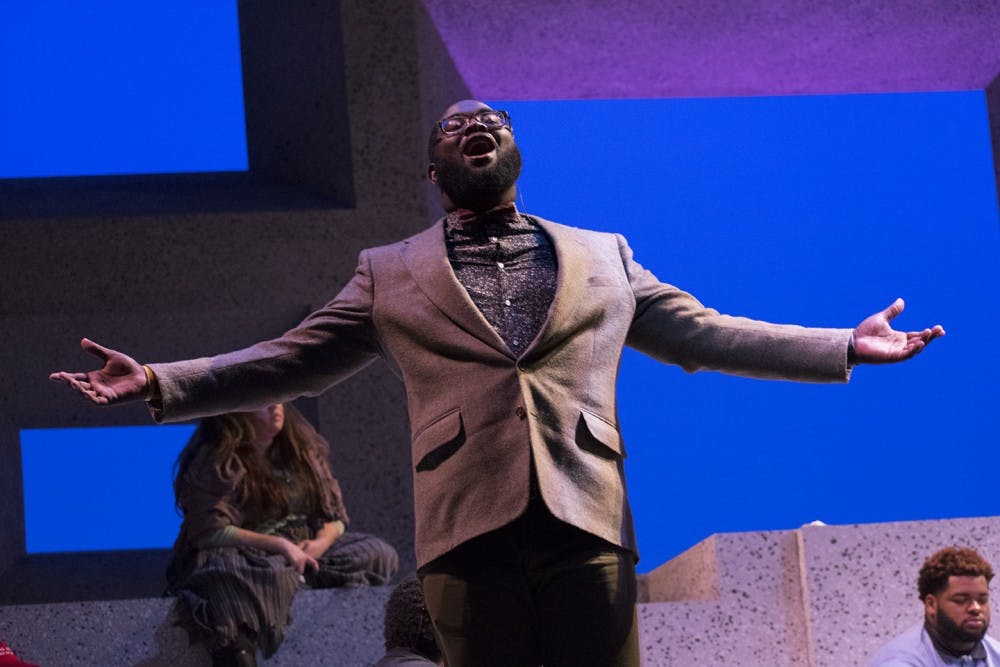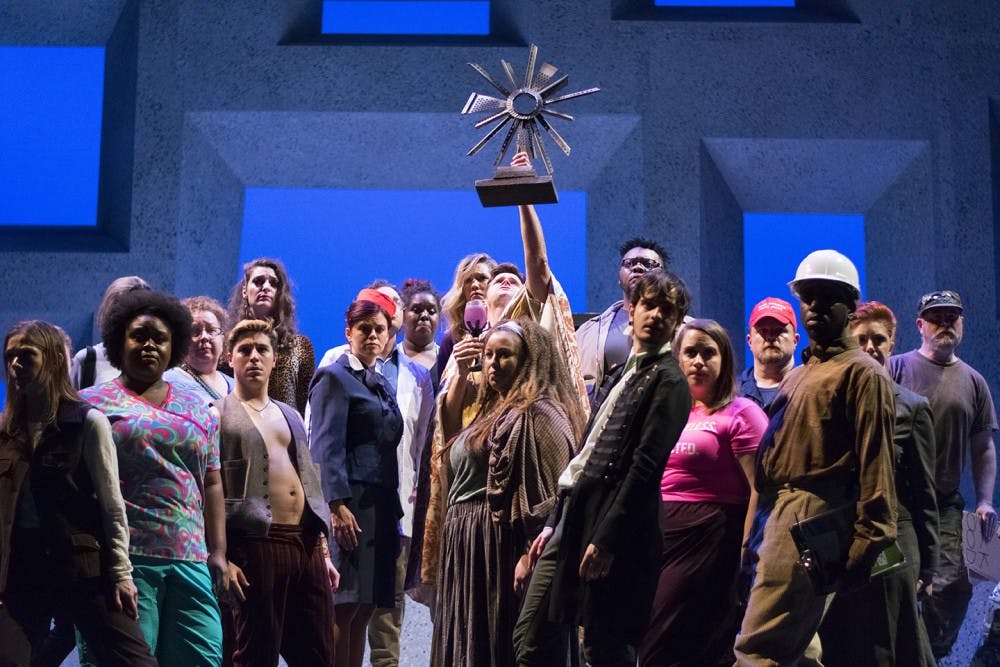Rehearsal for the USC's Bernstein MASS is borderline overwhelming. Singers are seated on the floor of hallways in the School of Music running through Latin song verses with each other. Music plays from speakers in small, sporadic bursts. It's a little frenzied, a little scattered — but in the creative, exciting way that the energy before a performance tends to be. Then the actors come together, take their places and the room suddenly comes alive.
These are the Street Singers, one of many ensembles performing in the Bernstein MASS — a theatrical work about love and peace, written by American composer Leonard Bernstein. In 1971, Jacqueline Kennedy Onassis commissioned Bernstein to create the piece for the opening of the John F. Kennedy Center for the Performing Arts.
“[Bernstein] decided to write this symphony of a thousand essentially,” said MASS conductor Scott Weiss. “He used the Roman Catholic Mass as sort of his framework for this theater piece. It’s not a mass in the way that a Mozart mass or a Beethoven mass is a mass … he literally calls it a theater piece for actors, dancers, musicians and singers.”
The Street Singers count for only a fraction of those performing in the show; according to Weiss, USC’s production will include nearly 250 performers, making it dependent on commitment from multiple departments on campus right from the start.
“Dean Harding became really kind of the driving force behind all of it," Weiss said. "He was the one that brokered commitments from all of the different entities and who eventually was the one that decided, ‘Yes, we’re doing this.’”

The MASS is the School of Music’s biggest musical event of the year, and while pulling off the MASS is certainly a rewarding feat, its magnitude meant that the School of Music had to put a lot of its normal work on hold. During the weeks leading up to MASS, they could not bring in guest artists or send students to competitions around the country. All energy needed to be focused on this production.
"At any point in time during the day, somebody's rehearsing MASS," Weiss said.
Derrick Burbage is a third-year music education student who plays trumpet in the MASS' marching band and says that preparing for the show has been intense.
"Bernstein Mass is an incredible work, and I think one of the things that makes it so impressive is just the sheer number and variety of musicians and performers," Burbage said. "It really just stretches the limits of the School of Music, which is probably why it's not performed so often."
Though the students are currently in the throes of daily rehearsal, preparation for the show actually began nearly a year ago for people like Weiss and stage director Ellen Douglas Schlaefer.
Schlaefer is an associate professor at the School of Music and director of opera studies. Her role in the MASS is to organize and coordinate the non-musical aspects; this includes deciding how to convey the gravity of Bernstein’s piece to the public.
"Ellen Schlaefer's made some incredible decisions artistically about this piece, and situating it in the present day," Weiss said. "It is incredibly poignant, and timely and appropriate.”
Schlaefer said that part of getting the audience to buy in is exactly that – the decision to set the piece in 2018 rather than make it a period piece, one set in the ‘70s. But this isn’t easy to pull off.

“It’s something I’ve been struggling with for a long time … it’s a hard sell in a lot of ways," Schlaefer said. "You can't pigeon-hole it, and everyone wants things pigeon-holed right now."
This inability to categorize the show stems from its eclectic nature; it is not exactly a play or a symphony or an opera, but rather a composite of the performing arts that reflects the melting-pot nature of the United States.
In addition to making heavy decisions, one of Schlaefer's biggest challenges comes in day-to-day logistical elements, like coordinating rehearsal times with her performers. With the show encompassing so many students, it is hard to come up with schedules that work for everyone, but the fact that it involves so many areas of the school is part of what makes the MASS so important for USC and the community surrounding it.
"This is a Carolina, homegrown thing here, with the exception of the guy we're bringing in,” Schlaefer said.
“The guy” is Kevin Vortmann, a professional actor from Seattle who was a little bit of an enigma until very recently when he arrived on campus; no one had ever met him in person, but they had heard of his previous experiences in the MASS and on Broadway. Vortmann plays the main character in the production — the Celebrant.
"The role of the celebrant is central to the drama of the piece,” Weiss said. “It’s also central to the music of the piece, and it’s exceedingly hard—like Tony in West Side story, but maybe harder.”
Prior to USC’s production of the MASS, Vortmann played the Celebrant once before with the Philadelphia Orchestra in 2015. He says that the way rehearsals are structured at USC — with ensembles split off into separate groups — has allowed him to work more closely with other performers than he would have been able to in a professional symphony.

“It’s nice because it doesn't feel as overwhelming," Vortmann said. "I get a chance in a rehearsal — because it’s not the only rehearsal — to say thank you and to maybe offer what I need as a singer and make sure that we are making music together."
Vortmann understands that he will not have the time to build lasting relationships with the students, but he still finds value working with them each day.
“The nice part about working with students is that it’s still fresh for them," Vortmann said. "It’s nice to be reminded of the enthusiasm that I once had when I was still training in a program and it ends up really energizing you, because it is infectious.”
One such student is Hannah Thompson, a first-year voice performance master’s student, who plays the role of a college kid in the Street Singer ensemble. It has been helpful for Thompson and her fellow performers to have Vortmann here for rehearsals. Before he was in South Carolina, they had to practice scenes imagining that the Celebrant was there.
“It’s like a whole new show with him,” she said. “He’s amazing, really talented vocally and an amazing actor.”
It was around the time of Vortmann’s arrival that the show began to come together as a cohesive unit. This involved the gradual integration of the different elements piece by piece. Solo singers started to work with the orchestra, followed by the blues and rock bands and then the choir and finally the celebrant.
This process may seem like a difficult undertaking, but the expertise of the show's leaders has helped the transition go smoothly.
"Our directors are extremely professional and very good at what they do," Burbage said. "They keep a strong handle on where everything needs to be going."
Schlaefer says that with a production such as the MASS whose performers range in experience level from children to students to professionals, making sure that it all comes together is both challenging and rewarding.
“But that’s what they’re here to do — they’re here to learn. So that’s what we’re here to do, is to help them experiment,” Schlaefer said. "Seeing the discoveries they make in rehearsal is rewarding every day.”

Like Schlaefer, performers find rewarding aspects in putting on the MASS at a personal levels, but everyone involved shares a greater, common goal too: bringing the community together to hear Bernstein’s ultimate message.
“I really believe that the central message of this piece was, is about unity, it’s about common ground, it’s about humanity,” Weiss said. “Many people will find in this piece a whole lot of similarities to things that we are wrestling with in our own society today.”
In some ways, this message reflects the process of putting the whole production together — especially in regard to the idea of togetherness. On March 2, when the show finally opens to the public, USC students and community members will share a stage in one multifaceted, yet cohesive production.
“What’s beautiful about the piece is that idea of trying to find unity amidst conflict,” Vortmann said. “This piece is a cautionary tale … we may not tie up loose ends, but we shouldn’t forget what makes all of us part of the human race.”
Check out SGTV's sneak peak of the MASS featuring Vortmann and the music school dean Tayloe Harding.

